Everything May Have Already Disappeared
CRIT
12-05-02022
How long were our bodies wandering the Earth before【WE】appeared? When was it that【BODY】&【EARTH】were torn separate from pure totality?
When, for Gටᗪ’s sake, do I stop feeling the tear?
Was it a mistake when, in our deep past, our distant lineage drew a circle in the soft shore sand of reality, stepped inside it & declared . . .
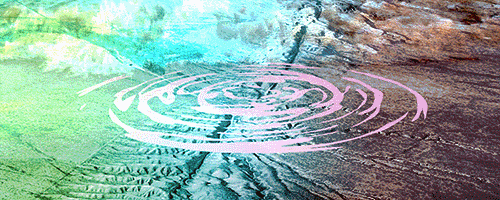
After each erasing wave, the circle must be redrawn.
The waves are coming faster & faster.
And here, with this endless disappearance/appearance, Jean Baudrillard begins his essay, Why Hasn't Everything Already Disappeared?
Well, Baudrillard, here is my first question: does a declaration even mark an appearance?
Cause I’m thinking of revolutionary examples; 𝙲𝚘𝚖𝚖𝚞𝚗𝚒𝚜𝚖 will do. Does 𝙲𝚘𝚖𝚖𝚞𝚗𝚒𝚜𝚖 appear in 1848, at the moment Marx & Engel’s inked their pub chats into The Communist Manifesto?
I don’t think so.
I think 𝙲𝚘𝚖𝚖𝚞𝚗𝚒𝚜𝚖 appears in 1917, as the worker draws their circle, declaring . . .
I think a revolution is like an orgasm; it appears, after much building & tantric circulation of energy, all at once. Great swaths of humans have to be edging en masse, waiting for the right lover's name to scream.
Or maybe they’re not waiting.
Maybe the moment of climax comes by surprise, and the revolution screams the name of whatever ideology catches its ecstatic lolling gaze.
I read once that the two most common words shouted during an orgasm were “Gටᗪ!”, or carnal the partner’s name. In that moment they might as well be synonyms. Similarly, at the peak of revolution, it seems like we can scream any name & watch our Gටᗪ appear.
And as the ecstasy settles, and Gටᗪ is sleeping peacefully, we slip on our proper attire to return the abode of sensibility. The spirit of that revolution soon as faint as perfume on our collar.
And 𝙲𝚘𝚖𝚖𝚞𝚗𝚒𝚜𝚖 becomes a name chiseled above the door of that abode. Many old things are allowed inside, many new things disappear in the basement furnace, 𝙲𝚘𝚖𝚖𝚞𝚗𝚒𝚜𝚖 stays chiseled above the door.
𝓐𝓶𝓮𝓻𝓲𝓬𝓪𝓷 𝓓𝓮𝓶𝓸𝓬𝓻𝓪𝓬𝔂 was also a revolutionary appearance.
But, to me, it now feels like the fulfillment center of a large for-profit venture. Fluctuating rituals, brands, concepts, & ideologies fly across dynamic conveyors into waiting sprinter vans. Deliveries to satisfy every positive ROI 𝓭𝓮𝓼𝓲𝓻𝓮.
It's a mostly automated process; I can’t find a job to do worth doing. So, I sort of wander around, as robotics maneuver around me & data passes through me. The once warming sense of solace from knowing that somewhere on the roof above me a neon sign glitters . . .
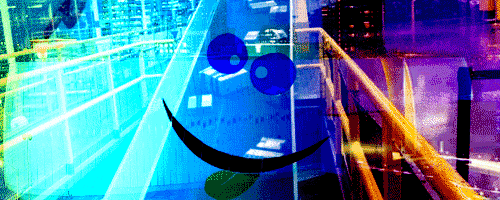
. . . that solace has cooled to near zero. I feel barely there.
Ideologies pound their chests, claiming that within them, unseen, beats the heart of revolution. That first scream in the throes of passion with a Gටᗪ, screams on. But maybe, as Baudrillard hints, that scream initiates the disappearance. Soon that ideology will be a Cheshire Cat grin, hanging in air as its GටᗪHEAD fades.
It occurs to me why the 𝓛𝓞𝓥𝓔 we bare each other might be my best view of a true appearance. It is not the【PERSON】I 𝓛𝓞𝓥𝓔, not their stable concept. What I 𝓛𝓞𝓥𝓔 is the continual appearance flowing out that concept from the unseeable wellspring. Some Hegelian totality. I 𝓛𝓞𝓥𝓔 what keeps appearing . . . but never fully appears. No matter the years of 𝓛𝓞𝓥𝓘𝓝𝓖 a【PERSON】, that 𝓛𝓞𝓥𝓔 sips from a secret. I suspect the secret must be kept to keep a taste of Gටᗪ on the tongue. How beautifully, beautifully maddening.
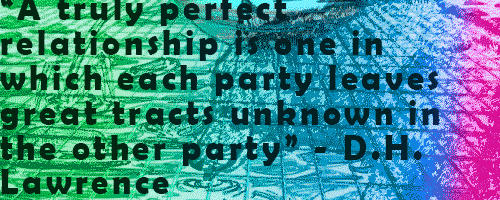
The Buddha’s enlightenment, the Christ’s pure consciousness, might just be the 𝓛𝓞𝓥𝓔 of one thing . . . the infinite appearing.
I try to apply this to an ideology. I try to fall in 𝓛𝓞𝓥𝓔 with its great tracts of unknown . . . appearing & appearing & appearing. But I can’t do it. But I think I can 𝓛𝓞𝓥𝓔 its nature to decay, to become soil for the next appearance. I 𝓛𝓞𝓥𝓔 the infinite disappearing, which, I guess, is close.
And seems like it might be a’ight with Baudrillard, who insists that ideologies are programmed to disappear, to sink slowly into the sand from the moment of conceptualization.
From this perspective, the goal of colonizing Mars is just a reaction to【EARTH】, our ailing conceptual home, inability to keep pace with the exponential speed of circle drawing that defines our age.
Our mind’s migration to the digital? Just the reaction of a【BODY】seeking to flee a material that can’t keep pace with the exponential speed of circle drawing that defines our age.
But I am starting to doubt that I am a machine designed to draw circles for as long as possible. A machine that time only deteriorates; that regards moments as miles on an unseen engine.
Everything that crumbles, crumbles into something. Nothing seems to disappear but the form, no, the concept that【LABELS】the form. A concept, an ideology, neither owns any of the material that is held as evidence of its appearance . . . all appearance is on loan from my mind.
Well then, if the clothes have no emperor, maybe even I have never truly appeared. No need for a digital singularity, I need not wait for end-of-history transcendence, my disappearance was here from the git.
Why does the wet ware hyper-computer, hard cased in my skull, trudge on with individual conceptual appearance charade? What’s it doing for me? Why not melt into that old, old A L L ?
But, alas, as one thing deteriorates, it only seems to yield a view the deeper 𝓭𝓮𝓼𝓲𝓻𝓮 beneath . . . hanging in the air like that Cheshire Cat’s grin. 𝔹𝔼𝕃𝕀𝔼𝕍𝔼 𝕀ℕ ℂℍℝ𝕀𝕊𝕋 said the church sign. Across the street, 𝘽𝙀𝙇𝙄𝙀𝙑𝙀 𝙄𝙉 𝙎𝘾𝙄𝙀𝙉𝘾𝙀 says the lawn sign.
All judgments aside, what lies beneath the BELIEVE of both statements. What grin unfurls across both faces?
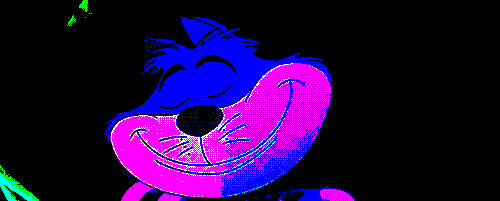
As we rapidly accelerate toward the hypothesized total exhaustion of our material realm, are we aware of our possible urge to disappear? Do we give due thought to the 𝓭𝓮𝓼𝓲𝓻𝓮 to begone that might be behind the wheel?
Because the【WE】we treasure may only appear in the space between reality & 𝓭𝓮𝓼𝓲𝓻𝓮. The anxiety of our age could be the feeling that those two walls are closing in.
It’s a stressful place . . . in a [[trash compactor]].
So much of culture screams for rapidity, it requires my continued discipline to stay connected to slowness & patience, to remember to appreciate the ‘time of emergence’ that was once a mandatory aspect of being. I was led to believe this ‘time of emergence’ was always oppressive tedium, but why does the subtle materialization of the in a square of Polaroid, developing slowly through infinite temporal states of opacity, appearing & appearing & appearing.
The digital image & developed photograph stand, to Baudrillard, as an example of a closing.
I’m told by many media mouths that moment when I may be able to generate any stimuli I 𝓭𝓮𝓼𝓲𝓻𝓮 is close. After the appearance of unbounded digital optionality, will my required confrontation with reality disappear? Will augmented reality glasses filter the trash & hunched human bodies from my visual field?
What appears then? What Cheshire Cat grin? In its absence, I may have to confront my 𝓭𝓮𝓼𝓲𝓻𝓮 for suffering & trauma, a 𝓭𝓮𝓼𝓲𝓻𝓮 for confrontation. Am I ready to confront that?
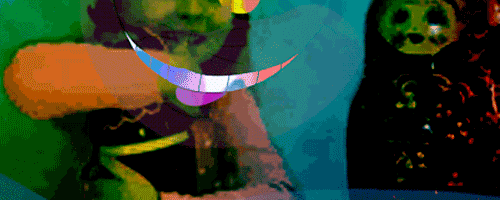
Maybe every disappearance just appears a new image of our deeper nature, infinite floating grins in a nesting doll.
I’ve always empathized with the superstition of being photographed; that each image of me absconds with a bit of my soul, diluting my essence. Whether or not there is any truth to this superstition, the【REAL】of an image isn’t defined by the person in it, that【REAL】is surrendered to the, now potentially infinite, viewers. The more views, the less my【REAL】is up to me. In this collapse, I’m confronted with quite clearly the truth of my【REAL】. . . it only existed in my head.
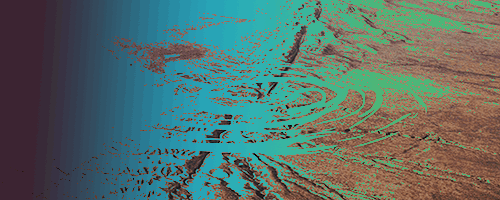
When, for Gටᗪ’s sake, do I stop feeling the tear?
Was it a mistake when, in our deep past, our distant lineage drew a circle in the soft shore sand of reality, stepped inside it & declared . . .
【WE HAVE APPEARED!】

After each erasing wave, the circle must be redrawn.
The waves are coming faster & faster.
And here, with this endless disappearance/appearance, Jean Baudrillard begins his essay, Why Hasn't Everything Already Disappeared?
Well, Baudrillard, here is my first question: does a declaration even mark an appearance?
Cause I’m thinking of revolutionary examples; 𝙲𝚘𝚖𝚖𝚞𝚗𝚒𝚜𝚖 will do. Does 𝙲𝚘𝚖𝚖𝚞𝚗𝚒𝚜𝚖 appear in 1848, at the moment Marx & Engel’s inked their pub chats into The Communist Manifesto?
I don’t think so.
I think 𝙲𝚘𝚖𝚖𝚞𝚗𝚒𝚜𝚖 appears in 1917, as the worker draws their circle, declaring . . .
【WE HAVE APPEARED!】
I think a revolution is like an orgasm; it appears, after much building & tantric circulation of energy, all at once. Great swaths of humans have to be edging en masse, waiting for the right lover's name to scream.
Or maybe they’re not waiting.
Maybe the moment of climax comes by surprise, and the revolution screams the name of whatever ideology catches its ecstatic lolling gaze.
I read once that the two most common words shouted during an orgasm were “Gටᗪ!”, or carnal the partner’s name. In that moment they might as well be synonyms. Similarly, at the peak of revolution, it seems like we can scream any name & watch our Gටᗪ appear.
And as the ecstasy settles, and Gටᗪ is sleeping peacefully, we slip on our proper attire to return the abode of sensibility. The spirit of that revolution soon as faint as perfume on our collar.
And 𝙲𝚘𝚖𝚖𝚞𝚗𝚒𝚜𝚖 becomes a name chiseled above the door of that abode. Many old things are allowed inside, many new things disappear in the basement furnace, 𝙲𝚘𝚖𝚖𝚞𝚗𝚒𝚜𝚖 stays chiseled above the door.
What has appeared?
𝓐𝓶𝓮𝓻𝓲𝓬𝓪𝓷 𝓓𝓮𝓶𝓸𝓬𝓻𝓪𝓬𝔂 was also a revolutionary appearance.
But, to me, it now feels like the fulfillment center of a large for-profit venture. Fluctuating rituals, brands, concepts, & ideologies fly across dynamic conveyors into waiting sprinter vans. Deliveries to satisfy every positive ROI 𝓭𝓮𝓼𝓲𝓻𝓮.
It's a mostly automated process; I can’t find a job to do worth doing. So, I sort of wander around, as robotics maneuver around me & data passes through me. The once warming sense of solace from knowing that somewhere on the roof above me a neon sign glitters . . .

. . . that solace has cooled to near zero. I feel barely there.
What has appeared?
Ideologies pound their chests, claiming that within them, unseen, beats the heart of revolution. That first scream in the throes of passion with a Gටᗪ, screams on. But maybe, as Baudrillard hints, that scream initiates the disappearance. Soon that ideology will be a Cheshire Cat grin, hanging in air as its GටᗪHEAD fades.
It occurs to me why the 𝓛𝓞𝓥𝓔 we bare each other might be my best view of a true appearance. It is not the【PERSON】I 𝓛𝓞𝓥𝓔, not their stable concept. What I 𝓛𝓞𝓥𝓔 is the continual appearance flowing out that concept from the unseeable wellspring. Some Hegelian totality. I 𝓛𝓞𝓥𝓔 what keeps appearing . . . but never fully appears. No matter the years of 𝓛𝓞𝓥𝓘𝓝𝓖 a【PERSON】, that 𝓛𝓞𝓥𝓔 sips from a secret. I suspect the secret must be kept to keep a taste of Gටᗪ on the tongue. How beautifully, beautifully maddening.

The Buddha’s enlightenment, the Christ’s pure consciousness, might just be the 𝓛𝓞𝓥𝓔 of one thing . . . the infinite appearing.
I try to apply this to an ideology. I try to fall in 𝓛𝓞𝓥𝓔 with its great tracts of unknown . . . appearing & appearing & appearing. But I can’t do it. But I think I can 𝓛𝓞𝓥𝓔 its nature to decay, to become soil for the next appearance. I 𝓛𝓞𝓥𝓔 the infinite disappearing, which, I guess, is close.
And seems like it might be a’ight with Baudrillard, who insists that ideologies are programmed to disappear, to sink slowly into the sand from the moment of conceptualization.
We must keep drawing.
From this perspective, the goal of colonizing Mars is just a reaction to【EARTH】, our ailing conceptual home, inability to keep pace with the exponential speed of circle drawing that defines our age.
Our mind’s migration to the digital? Just the reaction of a【BODY】seeking to flee a material that can’t keep pace with the exponential speed of circle drawing that defines our age.
My body feels slower & farther away with each passing OS update.
“At the end point of this rise of the machine, in which all human intelligence is encapsulated—a machine which is now assured of total autonomy as a result—it is clear that mankind exists only at the cost of its own death. It becomes immortal only by paying the price of its technological disappearance.” - Jean Baudrillard
But I am starting to doubt that I am a machine designed to draw circles for as long as possible. A machine that time only deteriorates; that regards moments as miles on an unseen engine.
Everything that crumbles, crumbles into something. Nothing seems to disappear but the form, no, the concept that【LABELS】the form. A concept, an ideology, neither owns any of the material that is held as evidence of its appearance . . . all appearance is on loan from my mind.
Well then, if the clothes have no emperor, maybe even I have never truly appeared. No need for a digital singularity, I need not wait for end-of-history transcendence, my disappearance was here from the git.
“We must give disappearance back its prestige or, quite simply, its power, its impact. We must reinvest it not as a final but as an immanent dimension — Things live only on the basis of their disappearance, and, if one wishes to interpret them with entire lucidity, one must do so as a function of their disappearance.” - Jean Baudrillard
Why does the wet ware hyper-computer, hard cased in my skull, trudge on with individual conceptual appearance charade? What’s it doing for me? Why not melt into that old, old A L L ?
But, alas, as one thing deteriorates, it only seems to yield a view the deeper 𝓭𝓮𝓼𝓲𝓻𝓮 beneath . . . hanging in the air like that Cheshire Cat’s grin. 𝔹𝔼𝕃𝕀𝔼𝕍𝔼 𝕀ℕ ℂℍℝ𝕀𝕊𝕋 said the church sign. Across the street, 𝘽𝙀𝙇𝙄𝙀𝙑𝙀 𝙄𝙉 𝙎𝘾𝙄𝙀𝙉𝘾𝙀 says the lawn sign.
All judgments aside, what lies beneath the BELIEVE of both statements. What grin unfurls across both faces?

“Is it, in fact, the real we worship, or its disappearance?” - Jean Baudrillard
As we rapidly accelerate toward the hypothesized total exhaustion of our material realm, are we aware of our possible urge to disappear? Do we give due thought to the 𝓭𝓮𝓼𝓲𝓻𝓮 to begone that might be behind the wheel?
Because the【WE】we treasure may only appear in the space between reality & 𝓭𝓮𝓼𝓲𝓻𝓮. The anxiety of our age could be the feeling that those two walls are closing in.
It’s a stressful place . . . in a [[trash compactor]].
“This is what the digital lacks: the time of emergence.” - Jean Baudrillard
So much of culture screams for rapidity, it requires my continued discipline to stay connected to slowness & patience, to remember to appreciate the ‘time of emergence’ that was once a mandatory aspect of being. I was led to believe this ‘time of emergence’ was always oppressive tedium, but why does the subtle materialization of the in a square of Polaroid, developing slowly through infinite temporal states of opacity, appearing & appearing & appearing.
Why does that feel 𝓼𝓸 𝓼𝓪𝓽𝓲𝓼𝓯𝓲𝓬𝓲𝓷𝓰?
The digital image & developed photograph stand, to Baudrillard, as an example of a closing.
“Soon there will no longer be any thought-sensitive surface of confrontation, any suspension of thought between illusion and reality. There will be no blanks any more, no silences, no contradiction—just a single continuous flow, a single integrated circuit. This is what the digital lacks: the time of emergence.” - Jean Baudrillard
I’m told by many media mouths that moment when I may be able to generate any stimuli I 𝓭𝓮𝓼𝓲𝓻𝓮 is close. After the appearance of unbounded digital optionality, will my required confrontation with reality disappear? Will augmented reality glasses filter the trash & hunched human bodies from my visual field?
What appears then? What Cheshire Cat grin? In its absence, I may have to confront my 𝓭𝓮𝓼𝓲𝓻𝓮 for suffering & trauma, a 𝓭𝓮𝓼𝓲𝓻𝓮 for confrontation. Am I ready to confront that?

Maybe every disappearance just appears a new image of our deeper nature, infinite floating grins in a nesting doll.
“There is a mortal danger for the ‘real’ world, but also for the image, since, when it merges with the real and simply immerses itself in the real and recycles it, there no longer any image.” - Jean Baudrillard
I’ve always empathized with the superstition of being photographed; that each image of me absconds with a bit of my soul, diluting my essence. Whether or not there is any truth to this superstition, the【REAL】of an image isn’t defined by the person in it, that【REAL】is surrendered to the, now potentially infinite, viewers. The more views, the less my【REAL】is up to me. In this collapse, I’m confronted with quite clearly the truth of my【REAL】. . . it only existed in my head.


